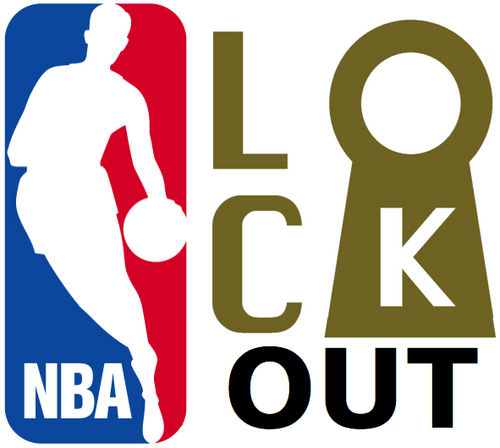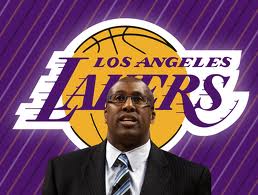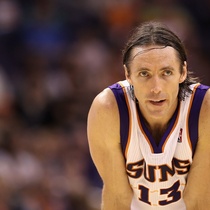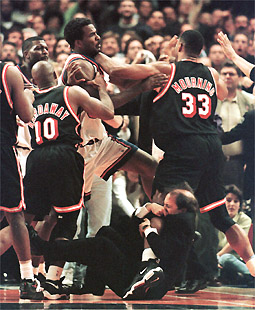Labor Negotiations, Point Guards, and Genius Economists
So I am starting to get a little obsessed with the ongoing progress, or lack thereof, in the National Basketball Association's labor dispute between the owners, (billionaires that mostly didn't get to be billionaires by accident), and the players, (millionaires that also mainly did not get there by accident, unless you consider being 'tall' an accident).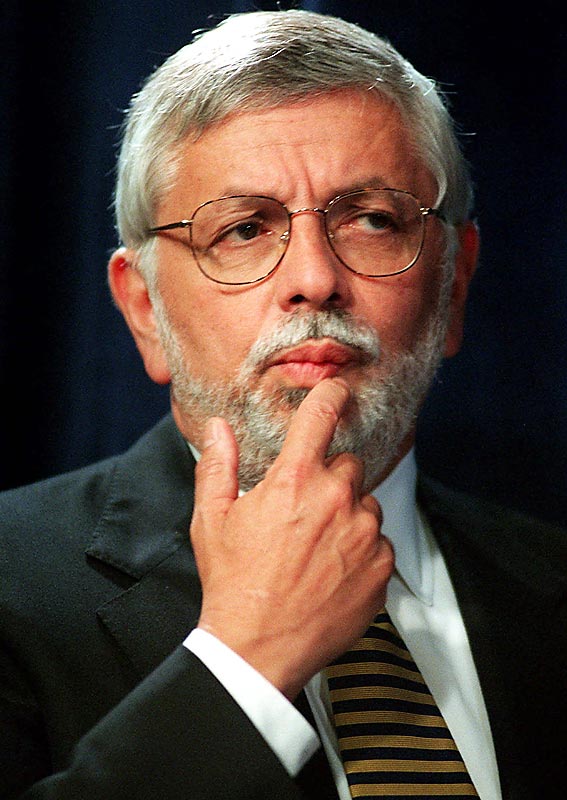 Who's that guy? That's not Metta WP.
Who's that guy? That's not Metta WP.
For months the negotiations have dragged on, and last week the league announced the postponement of the start of team training camps and the cancellation of several early pre-season games. These developments, while not totally unexpected, act to raise the pressure on both sides to reach a settlement quickly, as the start of the NBA regular season, (and the point where players and owners actually start to feel the economic impact of the labor problems), is clearly in jeopardy of being postponed as well. Soon, each week the league and its players fail to come to an agreement means a week of games that will not be played, effecting players, team staffs, arena workers, media and broadcast partners, and all the extended ecosystem of stakeholders in the league. Not to mention me, and how I'll need to find a way to kill every Tuesday, Wednesday, and Friday night from November until June.
From the ESPN.com piece linked above, here's a short recap of the last set of negotiations between the league officials, and representatives for the player's union: (I've added some descriptors in parentheses for clarity).
(NBA Commissioner David) Stern celebrated his 69th birthday Thursday but didn't appear in a festive mood after meeting for about five hours with leaders from the union. He was joined by Silver, the deputy commissioner, Spurs owner Peter Holt, who heads the labor relations committee, and NBA senior vice president and deputy general counsel Dan Rube. (Los Angeles Lakers Point Guard Derek) Fisher, (Union chief Billy)Hunter, attorney Ron Klempner and economist Kevin Murphy represented the union.
A description of a classic 'Management v. Union' negotiating meeting, right? High-ranking officials from the league, the Union Chief, the player's rep (Fisher), and of course a couple of lawyers and even an economist tossed in for good measure by the player's side.
Typical unless you take a closer look at the one, 'sort of out of place but not really because I've never heard of him' Economist, Kevin Murphy.
Because Mr. Murphy is not just an ordinary economist - in fact he might be one of the smartest and most influential economists out there. From Mr. Murphy's Wikipedia page:
In 1997 Murphy was awarded the prestigious John Bates Clark Medal by the American Economic Association, given once every two years to the most outstanding American economist under the age of forty, and widely considered to be the second most prestigious prize in economics (after the Nobel Prize in Economics). Murphy was cited for his study of the causes of growing income inequality between white-collar and blue-collar workers in the United States and his research linking the growth in income inequality to growth in the demand for skilled labor. His other research has covered such topics as economic growth, income inequality, valuing medical research, rational addiction, and unemployment.
On September 20, 2005, he was named as one of the 2005 recipients of the MacArthur Fellowship, often referred to as the "genius grant."
So I can imagine the mindset of Commissioner Stern, (no dummy certainly), and the league owners in all this. They have (collectively), more money, more power, more control, and probably think more negotiating leverage in this situation. They usually sit across the table from union officials and player representatives and have to think - 'We're smarter than them.'. It would not be an irrational conclusion.
But all of a sudden the meeting starts, and in walks the economic genius, Mr. Murphy along with the Union Chief and the Lakers point guard, and I wonder if Stern and the owners did a double take. Did they know who Mr. Murphy is? Did they have any idea about his history and reputation? Did they know they were sitting across a 'not quite but probably pretty soon Nobel prize candidate'?
You want to win your Beer League Friday night softball game? Easy. Bring in a ringer from the local college baseball team and claim he's the new guy in Accounting.
Want to get an edge at the negotiating table? Drop a 'genius' economist next to your starting point guard.
Eventually a deal will be reached, and the games will be scheduled, and it is hard to know which side will 'win', but for me I'll give the players the halftime lead for their creative approach to stacking their team.

 Steve
Steve
